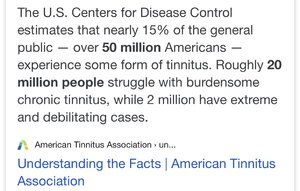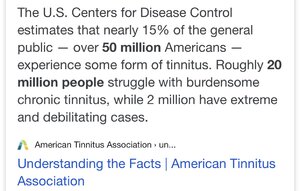I agree with what you are stating. I really would have been better saying they may be a dead end. That is because if the other types of treatments for hair cells and synapses are successful stopping tinnitus, there may potentially be little or no benefit by using this treatment too.I certainly think that for the majority of people, restoring hearing will hopefully cure or at least greatly reduce their tinnitus issues/suffering. However, I think it is a bit short sighted to think of these other avenues of treatment as a "dead end", there are a large number of people whose tinnitus is caused or exacerbated by other conditions (not just hearing loss), and though I have high hopes for things like FX-322, it isn't going to be the golden ticket for all of us here.
I say this as someone who suffers from hearing loss that fluctuates somewhat dramatically, and with tinnitus that does the same. In my personal case there is often little correlation between the amount of auditory stimulation and the amount of tinnitus. I'm likely an edge case, but point being - I think that it's worth the time and effort to look at treatments such as these.
The take that you have on FX-322 might be correct. Consequently choosing to use a treatment like OTO-313 might also assist as a in between if you have the ability to take FX-322 but no treatment for synapses is available. I still think that there will be a lot of people who will require both hair cell repair and synapse repair to resolve their tinnitus. So far evidence has proven that when a hearing device is used it does alleviate tinnitus, though there are people also with normal audiograms also experiencing tinnitus. This indicates it is caused by synapse damage. It will be very very intriguing to see really whether anyone after treating these two things still has tinnitus and hence then OTO-313 may be of further benefit. Otherwise obviously there will be questions around whether it is beneficial other than being a filler either before these treatments work or are available. Am still hoping and believing that the results thus far indicate that FX-322 and the treatment of synapses will be successful.

 Member
Member


 Yes, that's what I meant. You can maybe test for synaptopathy or at the very least inner hair cell function through acoustic reflex, but I'm not extremely certain about this.
Yes, that's what I meant. You can maybe test for synaptopathy or at the very least inner hair cell function through acoustic reflex, but I'm not extremely certain about this.